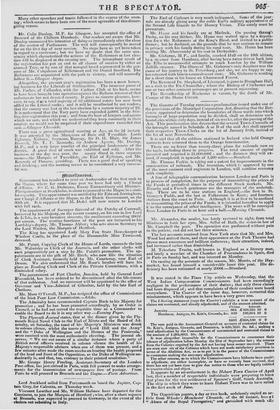The Gazette of Tuesday contains a proclamation issued under one
of the provisions of the Municipal Corporation Act, directing that the Bar- risters appointed to determine the boundaries of those wards into which boroughs of large population may be divided, shall so determine such boundaries within sixty days, instead of six weeks, after the passing of the Act. This proclamation also directs that the several Town- Councils of the boroughs named in Schedule A or B of the said Act shall appoint their respective Town- Clerks on the 1st of January 1836, instead of the 1st of next November.
It is said that all the soldiers stationed in Ireland who held Orange warrants have returned them to the Orange functionaries.
There are no fewer than twenty-three plans for railroads now on
the tapis, including those in progress. The total amount of capital invested and required is 21,000,000/. ; and the distance they will ex- tend, if completed, is upwards of 1,200 miles.—Standard.
Mr. Thomas Parkin is taking out a patent for improvements in the construction of railroads. The invention, which is approved by one of the most eminent civil engineers in London, will combine economy with simplicity.
A line of telegraphic communication between London and Paris is in process of completion, for the purpose of transmitting the prices of the Funds at periodical times in the different Stock markets. Mr. Ricardo and a French gentleman are the managers of the undertak- ing. There are to be nine stations in England,—the first in St. George's Fields, and the last at Folkestone in Kent ; and fourteen stations from the coast to Paris. Although it is at first to be confined to transmitting the prices of the Funds, it is intended hereafter to apply it to the conveyance of other intelligence. The news will be conveyed from London to Paris in an hour and a half.—Morniny Chronicle.


























 Previous page
Previous page